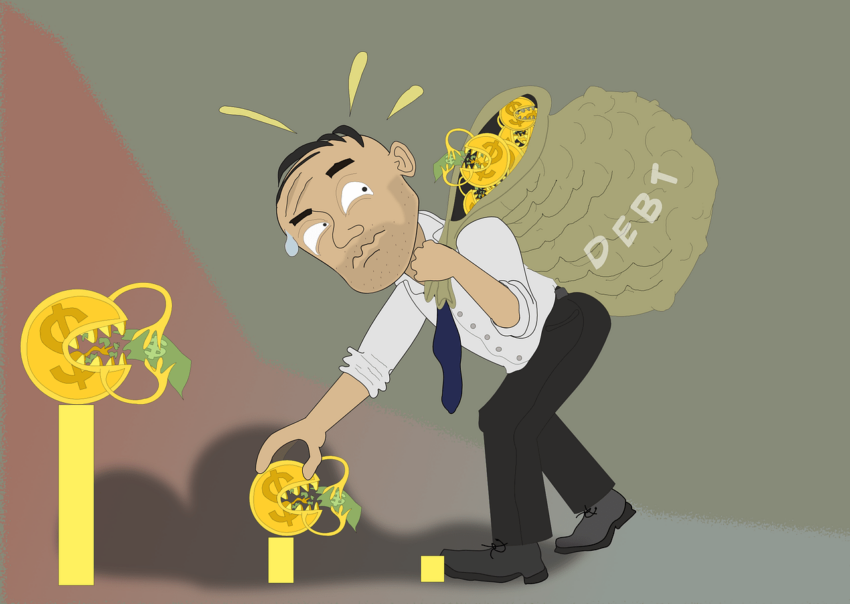What is the 11-word phrase to stop debt collectors? Debt collectors can be quite nagging, especially when they call you all the time or during odd hours of day or night. But what can you do to deter them from making these calls? Is it even possible to get them off your phone?
Besides asking them politely to keep off, there’s another effective way to prevent them from always calling you – the 11-word phrase. If you want to stop debt collectors from getting on your nerves, the “Please cease and desist all calls and contact with me, immediately,” phrase can work miracles.
It's the easiest way to force debt collectors to cease any form of communication with you. But what exactly does it mean? Also, how does it work?
But first, be sure to check out this piece on how to increase credit score for some valuable tips.
Without further ado, what is the 11-word debt escape clause?
Table of Contents
How to Use the 11-Word Debt Escape Clause

When debt collectors start calling, it can seem like they never want to leave you alone. They phone at all hours, even in the middle of the night, to ensure you get the message. This is a tactic to get you frustrated enough to make payments.
Persistent calls and messages can be quite annoying. Hence the need for a way to get away from them and stop the constant badgering.
The 11-word phrase is ideal in such situations. But, you must remember to say it the way it’s been written.
“Please cease and desist all calls and contact with me, immediately.”
The truth is, you must repay the debt. However, the FDCPA (Fair Debt Collection Practices Act) protects you as a consumer.
Creditors or debt collectors should not harass, intimidate, or offer threats in the name of collecting a debt. So, if they nag you with calls throughout the day, which might amount to harassment, you should use this “magic-working” phrase.
See Related: Mobile Home Equity Loan Options
Why are Debt Collectors Calling Me?

Making payments is one way to keep debt collectors off your back. They call and reach out to you if you miss making payments on time. Mostly, debt left unpaid for a long time is sent to debt collectors, who try to persuade you to make a payment.
Debt collectors have the green light to call you once they receive notice of the debt from the creditor. However, they must adhere to set rules governing debt collection. The Fair Debt Collection Practices Act was put in place for this purpose.
Under the Act, debt collectors must:
-
Call at the Right Time
No one wants to receive calls from a debt collector in the middle of the night. This is why all debt collectors are expected to call only during reasonable hours of the day. This is between 8 am and 9 pm. If it goes beyond 9 pm, then this might be deemed as harassment.
-
Never Use Misleading or False Representation
Debt collectors should be careful not to use false or deceptive representations when collecting debt from a defaulter. For instance, they should never pretend to be affiliated with the US government or wear a badge or uniform that might mislead the consumer.
-
Never Threaten or Harass the Debtor
All debt collectors must treat you fairly and not threaten or harass you in any way. For instance, no one should threaten you with jail time just because you haven't paid a debt. And if any debt collector does this, they are undoubtedly breaking the law.
-
Never Follow or Visit your Place of Work
Despite you owing some money to creditors, debt collectors should not just pop up at your workplace demanding payments. In fact, they should not tell you about the debt at any place inconvenient to you. They can only do so with your consent.
However, they can contact your employer under certain circumstances. For instance, to ask for your details such as phone number or home address.
-
Not Communicating with Third Parties Regarding the Debt
At no time, except under special conditions as set out in section 1692b of the FDCPA, should a debt collector call or contact third parties regarding the collection of the debt. These include your spouse, friends, or family members.
When the consumer can't get hold of the consumer, they can only talk to the consumer's attorney or a consumer reporting agency, as the law permits. Any other communication will be against the consumer's rights.
-
Never Use Abusive Language
Has a debt collector used obscene or abusive language when contacting you? That’s against the law, and you can record them for evidence.
Always note these rules that debt collectors must adhere to when trying to reach you. If they go against any of them, you can sue them. And if you win the case, the collection agency must pay you compensation.
Best Steps to Take When a Debt Collector Calls You

So, now that you know the 11-word phrase to stop debt collectors, you understand the laws that govern them, what should you do when you get those calls from a debt collector?
Every debt collector must follow the law. There are specific steps they must follow when contacting you regarding your debt. The law states that all debt collectors must:
- Relay the creditor’s name
- State the actual debt amount
- Acknowledge that it's possible to dispute the stated debt
- Acknowledge that you can request the creditor's information
That first call that a debt collector makes to you is crucial. If they fail to relay any of this information at that time, they must ensure you receive it within 5 days.
It’s also within your right to request a debt validation letter from the creditor. Every creditor that gets in touch must send you a written debt validation letter stating the exact amount you owe.
So, what steps should you take after your first call with the debt collector?
1. Verify the Information
This is the first step to take. Do you have such a debt that the debtor collector is talking about? Or did they contact the wrong person?
If you don't owe anyone such kind of money, then you can let them know this and inform them not to call again. But if you do, you should also ensure that all the details regarding the debt are collected. Get the right information about the credit before taking any further steps.
Note: Never confirm the debt with the debt collector on the phone, even if you are certain that you owe such kind of money. This allows you to dispute the debt if you wish to do so later.
See Related: How to Borrow Money From Cash App: 11 Steps
2. Note the Statute of Limitations
Information is key when dealing with debt collectors. So, this is why you need to know about a time-barred debt.
This debt has exceeded the statute of limitation, meaning it can’t be collected. It means that they can’t call you about such debt.
It’s important to find out what the law says about time-barred debt in your state. This is because durations vary from one state to the next. In some places, the statute of limitation is set at 3 years, while for other states, it’s 6 or even 10.
Debt collectors can still call about such debt, but they have no right to force you to make payments. They’re also required to let you know how old the debt is so you can know if it’s past the statute of limitation.
3. Ensure You Record All Communication
Find a paper or notebook and start noting down some crucial information. First, write down the date when the debt collector started making calls. Keeping clear records is important for your own well-being.
So, note the day, the time, the duration of the call, and what the debt collector had to say. Remember, debt collectors have a fixed time when they can call you.
4. Keep Things Simple
Giving out your contact information and the amount you owe isn’t illegal when a debt collector call. However, be sure to keep things simple when they do. Avoid giving out information such as your financial standing and other personal details.
5. Decide What to Do
After you find out all information about the debt and see it’s still valid, you must decide what to do next. Thankfully, there are numerous steps you can take once debt collectors start reaching out. One common option is filing for bankruptcy.
Being deeply in debt can be tough, and you need an exit strategy. This is why folks opt to file for bankruptcy. This may seem like an exaggerated move when debt collectors start to call, but it’s an option you can consider.
If you don’t want to file for bankruptcy, you can choose to locate a reliable debt settlement company. They’re well-equipped to offer you debt relief during this challenging time.
But first, you have to negotiate a settlement with the debt collection agency. That way, you can pay what you can afford until you finish paying off the debt.
Another option is applying for a debt consolidation loan. You can approach a bank or another financial institution and apply for a debt consolidation loan. This loan helps you simplify the debt repayment process since you get to pay a much lower interest.
Some folks ignore the matter and utilize the 11-word phrase to stop debt collectors. But, this may not be the best long-term solution.
Debt collectors who cannot reach you have other ways to make sure you pay the loan or debt. For example, the collection agency can file a lawsuit that forces you to pay them what you owe.
How Can I Outsmart Debt Collectors?

Are you attempting to negotiate with the debt collector and want to have the upper hand? There are several tactics that you can use to outsmart debt collectors. These tactics are:
1. Remain Calm
Getting emotional when the debt collector calls is a no-no. Instead, learn to control your emotions when speaking with debt collectors.
Never use abusive language, as this can land you in trouble. If possible, keep the call short and request them to send you a written notice in less than 5 days.
2. Try to Negotiate
Your negotiating skills can come in handy when debt collectors call. They will most likely try to push you to pay back the entire amount you owe.
Since this may not be possible, let them know how much you can afford. If they agree, ask them to send you a written agreement showing they understand.
3. Review Credit Reports
Contact any of the 3 major credit reporting bureaus and get a credit report for free. This is possible to do once a year.
Afterward, check the reports with a fine-toothed comb to note any discrepancies. If there are accounts you don’t know exist, you are within your rights to dispute this with the bureaus.
4. Be Wary of Restarting the Clock
The statute of limitation can lead to time-barred debts that the collection agency can’t force you to pay. However, some tricky people can find a way around this, so you must be careful.
They can have you extend the statute of limitations which in certain states means restarting the clock on the old debt. This happens mostly when you validate that the debt is yours or agree to an extended repayment period.
How Do I Write a Cease and Desist Letter to Debt Collectors?
After telling off the debt collector on the phone using the 11-word phrase, you can also write a cease and desist letter. This is a formal request to the debt collectors to stop contacting you about the debt you owe.
If you write a cease and desist letter, the law states the debt collectors must obey.
However, they can still try and get in touch to make you pay the debt. This is possible by taking you to court and suing you to receive payment. Still, even with such a possibility, a cease and desist letter can be a good idea.
Essentially, this letter prevents the debt collector from contacting you by informing them they have the wrong person. No one wants to keep receiving calls about the money they don’t owe. In addition, the letter can notify the debt collector that the debt is time-barred, so they can’t force you to pay.
Do you want an example of a cease and desist letter to your debt collectors? Here is a simple example.
You can phrase the letter as follows:
Date
Your Name
Your Address
Debt Collector’s Name
Debt Collector’s Address
Dear Debt Collector,
According to my debt collections rights, as stipulated in the Fair Debt Collections Practices Act, it's my request that you cease and desist any verbal or written communication, regarding the said debt, with me, my friends, or my family.
I'm unaware of the debt, and further attempts to communicate with me will leave me no choice but to file a complaint with the Attorney General’s office and the CFPB (Consumer Financial Protection Bureau).
Thank you for your cooperation in this matter.
Sincerely
(Your Name)
When writing this cease and desist letter, be sure you have all the necessary documents. You can contact the debt collector to verify their address to include it in the letter. Add all information that you have from the collection agency and creditor.
FAQ
Can I Stop Debt Collectors from Suing Me?
If you want to protect yourself from lawsuits by debt collectors, it’s important to have proof you don’t owe the debt. This is possible if you have evidence showing you finished making payments. Or, you can prove the debt collectors have the wrong person.
In addition, you can negotiate a payment plan with the collection agency and adhere to it. This is one of the best ways to ensure the matter doesn’t end up in court.
Can I sue a Debt collector for harassment?
What are considered unfair behaviors by debt collectors?
Related Resources
- Best Books On Financial Independence
- Best Same-Day Pay Jobs You Should Try Today
- How to Build Wealth Like a Pro
